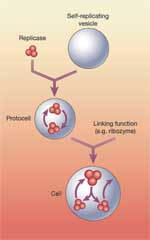Research
 |
Proposed pathway for cell synthesis
Click to enlarge |
Our laboratory is developing chemically-defined self-replicating systems that function as protocells for the study of the origin of life. We hope that our work will constrain models of the origin of life on earth and possibly explain some universal properties of present-day biological cells.
The minimum requirements for constructing a protocell are a self-assembling system for compartmentalization and an informational genome capable of self-replication. We study the biophysics, assembly, and dynamics of membrane-bound vesicles in order to produce structures that provide the compartmentalization function. Ribozyme polymerases and non-enzymatic nucleic acid replication systems are being developed to propagate the genome component.
Additional elements that may be introduced into protocells are simple ribozymes or aptamers that impart survival, growth, or replication advantages to the protocell. In vitro selection and directed evolution approaches are being used to generate novel nucleic acid and protein sequences with specific binding or enzymatic functions. These studies are designed to provide information on structure/function relationships, the relationship between sequence complexity and functional activity and the pathways by which macromolecules evolve in nature. Techniques developed for this work are also being elaborated to establish novel tools for drug discovery.
|